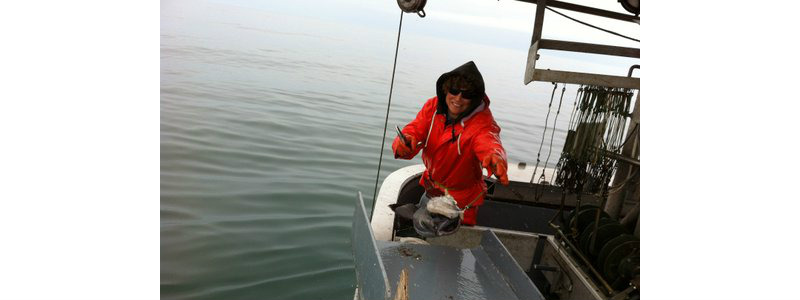To celebrate National Seafood month, we’re highlighting the women and men who bring sustainable seafood to our dinnertables. We’ll start our October series with Network Policy Council co-chair Linda Behnken, who’s fished the waters off Alaska her entire adult life. This article appeared in the Network’s From the Waterfront blog in 2017 and is reprinted with permission from Alaska Seafood Marketing Institute
I came to Alaska when I was in college. I had always wanted to see Alaska from reading about its wildness and beauty. I knew I loved being out on the water. I had the idea that I would come out and try to fish and make money for college that way. I did get a job on a fishing boat that first spring out here, and then I kept coming back.
I can remember when I delivered the first load of fish on my own boat. I had been crewing for years and bought a boat. When I fished a king salmon opening, I had a really good couple of days and when I came in and unloaded my fish, I remember being handed a check for my fish and feeling so excited. I love fishing now with our two boys. When we are all on deck working together, that’s a really great feeling.
I would like people to know more about the small boats and the fishing families that live in our small communities and how important fishing is to the social fabric of those places. I also want them to understand how committed the fishermen are to sustainable fisheries and the importance of having healthy fish stocks well into the future.
We should always be looking for ways to help the next generation of young fishermen from these communities be able to succeed in the fishery. It’s important to give back to the resource some of what we benefit from it. It helps provide fishermen with tools to maintain sustainable fisheries into the future. Getting fishermen to work together on all these conservation efforts and sharing information has been a huge success story for Alaska fisheries and management.
The world loves Alaska seafood but the world doesn’t know enough about the people who catch the seafood and the story and the commitment of those fisherman to healthy fisheries. I work quite a bit with fishermen in other parts of the country who deal with the issue of not having fish. The fact that we have healthy and abundant fisheries here is what makes it possible to be successful as a fisherman in Alaska.


